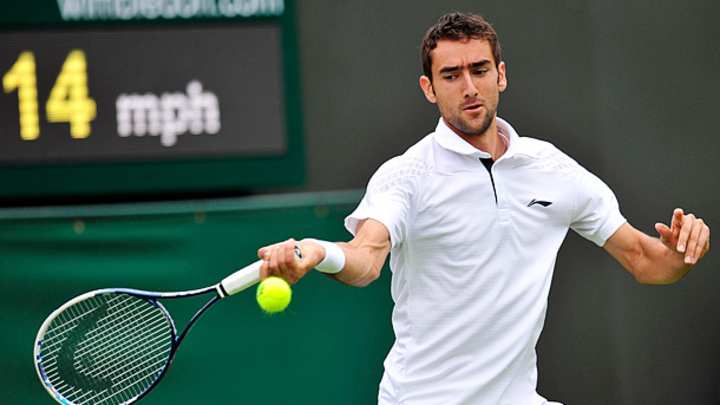Report: Marin Cilic confirmed failed drug test to former coach

Marin Cilic hasn't played since withdrawing from Wimbledon in late June. (Glyn Kirk/AFP/Getty Images)
Marin Cilic told his former coach that he failed a drug test at the BMW Open in Munich in May, according to The Guardian.
Croatian media reported over the weekend that Cilic had failed a drug test because of high glucose levels after ingesting an over-the-counter supplement without reading the warning label. Cilic, 24, learned of the positive test at Wimbledon and withdrew before his second-round match, citing a knee injury.
Bob Brett, who coached Cilic from 2004 until May of this year, says Cilic confirmed the reports to him during a telephone conversation.
"He said he had tested positive," Brett told The Guardian. "The one thing I found out was that he tested positive for high glucose and Marin had cooperated with the organization [the International Tennis Federation] about the product and the pharmacy. One of the people in his team bought it in a pharmacy – basically what you've been reading in the papers. Some people will say he made a mistake. But it was carelessness."
An ITF spokesperson told SI.com that the organization does not comment on potential, pending or current doping investigations and will not issue a statement unless a player has been found to have committed an anti-doping offense by an independent tribunal. Cilic's camp has yet to speak openly about the incident. “There will be no comment until we are able to comment," Cilic's manager told a Croatian newspaper.
Cilic, ranked No. 15, has not played a tournament since Wimbledon, fueling speculation that he is quietly serving a "provisional ban," in which he agrees not to compete for a set amount of time. He is still on the entry list for next week's Rogers Cup in Montreal.
The news of Cilic's reported failed test came the same week that Viktor Troicki was suspended for 18 months after refusing to provide a blood sample in Monte Carlo in April. Troicki claimed the doping officer excused him from the test because he was feeling ill. The independent tribunal rejected Troicki's claim, finding that he knew or should have known that the doping officer did not have the authority to let him skip the test.
Brett told The Guardian that the ATP and ITF need to do a better job educating the players about the anti-doping system. From the story:
Brett said he was disappointed in Cilic for not taking enough care. "All through the years I've always explained the importance of not buying products over the counter because of the risk of contaminated products," he said. "They believe that everything is going to be OK. In a sense they are naive to the risk. The player hopes it's OK and it's not. They are then tarnished, sponsors are reluctant to sign them to contracts and promote their products." All players are given a pamphlet containing all the anti-doping information they need but Brett feels that's not enough. "The [ATP and WTA] Tours need to help educate the players and people working with the players of the consequences and risk. Handing someone a pamphlet is like when you get something in the post; it tends not to get read. It has to be drummed into them."

Contributor, SI.com Nguyen is a freelance writer for SI.com, providing full coverage of professional tennis both on and off the court. Her content has become a must-read for fans and insiders to stay up-to-date with a sport that rarely rests. She has appeared on radio and TV talk shows all over the world and is one of the co-hosts of No Challenges Remaining, a weekly podcast available on iTunes. Nguyen graduated from the University of California, Irvine in 1999 and received a law degree from the University of California, Davis in 2002. She lives in the Bay Area.